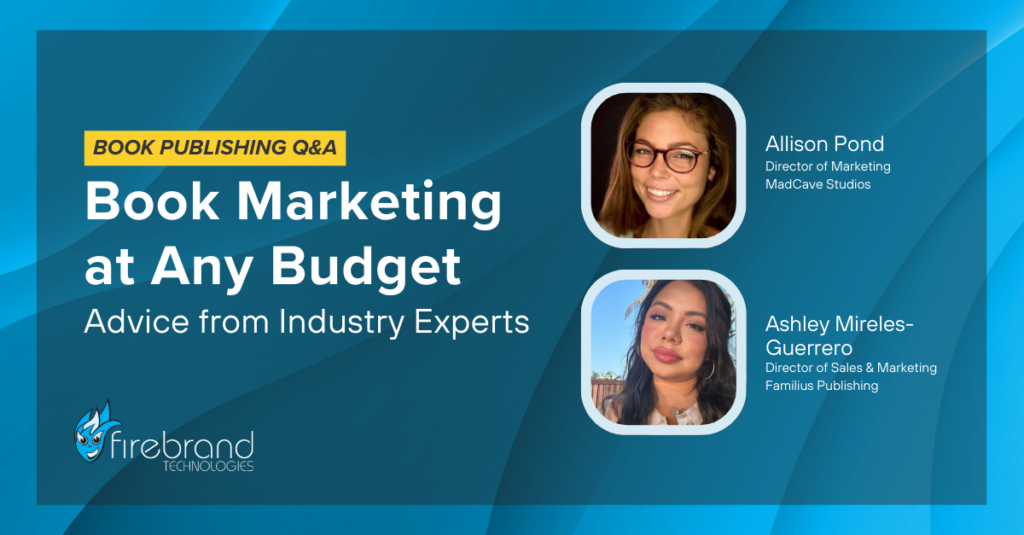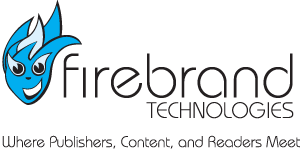
Think you need a big budget to market your book effectively? Think again!
At the Publishing Innovation Forum last September, we explored the art of book marketing in a session titled “Book Marketing at Any Budget.” Industry professionals gathered to discuss practical insights and creative strategies for publishers looking to maximize their marketing campaigns while also navigating budget constraints.
Two speakers from this session were Allison Pond and Ashley Mireles-Guerrero.
- Allison Pond oversees marketing and branding for Mad Cave Studios, Inc. where she has spearheaded campaigns for a variety of licensed classics, including Disney and Pixar, The Smurfs, Flash Gordon, King Arthur, and more.
- Ashley Mireles-Guerrero is the Director of Sales and Marketing for Familius Publishing, the author of more than 13 children’s books, and a strong advocate for diverse literature. She has served on the IBPA Board of Directors and as Chair of their DEI Committee.
After the conference, we caught up with Allison and Ashley to answer common questions publishers have about navigating marketing challenges, no matter the size of their budget. Here’s what they shared:
What is your main marketing advice for publishers working with a limited budget?
Allison Pond
Focus on understanding your audience deeply and tailoring your messaging to resonate specifically with them. Use and build the platforms that you own. Instead of trying to reach everyone, cultivate a dedicated, engaged community. Organic social media, email marketing, and collaboration with micro-influencers can offer significant reach without major expense. Prioritize quality over quantity in both audience engagement and content.
Ashley Mireles-Guerrero
When the budget is limited, your goals need to be targeted. Decide what the goal is and be specific about it. Then, seek out advertising and marketing outlets that will help you track your success. If you’re placing print ads, you might not be able to track your conversion or ROI. Digital marketing will give you more feedback data to make better decisions next time around.
Do you have any advice on what publishers should pay for vs. what they don’t necessarily need to pay for?
Allison Pond
Invest in high-quality cover design and compelling, well-targeted digital ads—especially on platforms like Amazon and META. These are usually worth the cost because they directly influence reader interest and discoverability. Also, skip spending heavily on non-targeted print ads or mass mailing if your audience is more likely to engage online. Finally, metadata updates and SEO optimization are often overlooked but are relatively low-cost and can make a big difference.
Ashley Mireles-Guerrero
This is a tough question to answer because it all depends on your goals and the individual books. Normally, we don’t pay for social media marketing; however, there are cases where we’ve done paid campaigns for a title because we didn’t already have an audience in that niche and needed to build it quickly. There are books that we don’t consider printing ARCs for at all and then there are those who we plan to have early finished copies to ship. Each book is going to have its own plan.
How can regularly updating metadata be a cost-effective boost to book marketing?
Allison Pond
Metadata (keywords, descriptions, awards, trade reviews, comps) can be one of the most affordable ways to boost visibility. Updating keywords based on new trade reviews, awards received, reading lists, current trends, seasonality, or even reader reviews keeps your book relevant and makes it easier for readers to find. Algorithms on most platforms rely heavily on metadata to surface content, so making strategic updates can keep titles visible without additional ad spending.
Ashley Mireles-Guerrero
Metadata is key to discoverability. Since language is constantly changing, your keywords should be as well. For us, we’re paying close attention to the words on parenting blogs and social media. When something like ‘mom guilt’ becomes the norm for describing parenting anxiety, it goes in our keywords. That helps these books that relate to the topic show up in searches. We also update descriptions as books gain traction. Pull quotes from reviews, awards, and best-seller listings should be called out and added to consumer-facing descriptions as you receive them. One that might be often overlooked but is also important is author bios, we ask our authors to send us updated bios once a year. It doesn’t do your books any good if your author is local but their bio still shows a hometown they were in 5 years ago.
What should the first step be when approaching a marketing campaign on a limited budget?
Allison Pond
Start with a clear understanding of your audience and their interests. Research where they spend their time online and what type of content resonates with them most. Then, plan a campaign that leverages free or low-cost channels like email, social media, and content marketing (blogs, videos, etc.) that speak directly to this group. Laying a strong, audience-specific foundation is key before you add any paid elements. For example; For Amazon, make sure to optimize your A+ content for your title page before you put ad spend behind it.
Ashley Mireles-Guerrero
Prioritize! What does this book need? Is it a title for libraries, and bookstores, is this a title that will be best found online? Identify your key market and prioritize your marketing based on where they discover books. Don’t be too rigid in the plan. Sometimes, you’ll plan for a book to be a library darling and find that it’s better suited to B2C sales. Prioritize but be ready to pivot if necessary.
Regardless of budget, where do you see the biggest return on investment in book marketing?
Allison Pond
Building your own data sets! An SMS or email list that you nurture consistently is one of the most effective ways to drive sales and engagement. Email marketing has a higher ROI than most other channels and provides direct access to your audience, allowing you to personalize messaging, promote new releases, and drive loyal readership. It’s invaluable for announcements, launches, and fostering a sense of community.
Ashley Mireles-Guerrero
Not to be a broken record, but it depends on the book and our goal. We can usually bet on a handful of social media influencers to move the needle. We’ve worked with them a long time and their audience is very receptive to what we do. We’re also now in a space where we can count on Amazon ads for a specific section of our catalog. We love SLJ’s virtual conferences for building our audience and we’ve also been happy with the regional trade associations conferences and digital advertising options for local authors.
What is the biggest misconception publishers have about marketing/advertising?
Allison Pond
A common misconception is that bigger budgets always yield better results. In reality, a well-targeted campaign that uses data and deep audience insights can outperform a broader, more expensive campaign. Marketing isn’t just about reach; it’s about connecting with the right people in a meaningful way. Authenticity and relevance often have a much greater impact than ad spend.
Ashley Mireles-Guerrero
If you talk to someone who works with a bigger publishing house than ours, you’ll probably hear that each book needs at least a $10K budget (I’ve actually been told this a few times). This isn’t true. But when you are smaller, you do need to be a bit more creative. A smaller budget often means more time spent building relationships with media and influencers who will become your network.
What is the most innovative, affordable marketing strategy you’ve seen from a publisher?
Allison Pond
Author-driven initiatives sparking the community and UGC on social media are highly engaging and a low-cost way to build excitement. This type of grassroots marketing can be powerful, especially having a reader-author connection.
Ashley Mireles-Guerrero
In addition to being the Director of Sales and Marketing at Familius, I’m also a bookstore owner and I’ve found that customers respond to print advertising. Microcosm Publishing does a poster about their publishing house and the process of getting a book published with them and customers LOVE it! They print their catalog on the back and we have folks come back to ask for books they’ve seen on the poster. It’s so simple and it has a huge impact.
For publishers with limited resources, what should they focus their time, energy, or money on?
Allison Pond
Focus on building strong relationships with your audience and partners. Prioritize partnerships with libraries, bookstores, and influencers who can expand your reach and who will be your biggest advocates long term. Investing time in developing a brand voice and cultivating long-term relationships will pay off more than short-lived promotional pushes.
Ashley Mireles-Guerrero
Good metadata and training your authors. Good metadata helps you cut through the internet algorithms and get your books out there. Training your authors gives you a small army of marketers that are eager and excited to talk about the books.
Marketing a book effectively doesn’t have to rely on a large budget. As Allison Pond and Ashley Mireles-Guerrero emphasized, success lies in understanding your audience, leveraging cost-effective tools like metadata updates and digital marketing, and focusing your efforts where they’ll have the greatest impact.
For publishers navigating tight budgets, remember: every book has unique needs, so flexibility, resourcefulness, and audience connection are key to unlocking its potential.
We hope these insights were useful to you!
